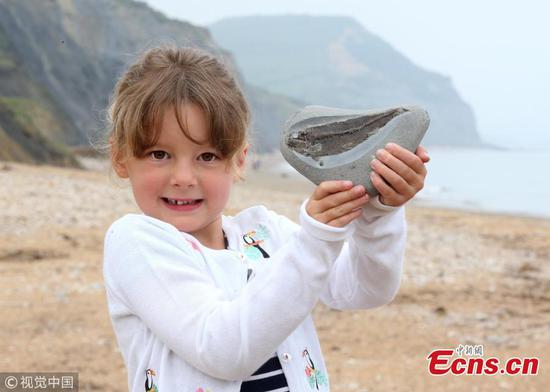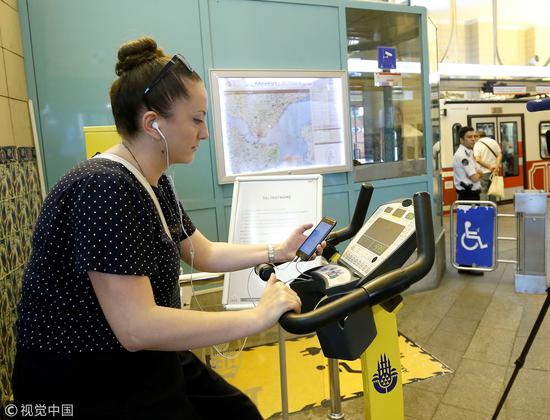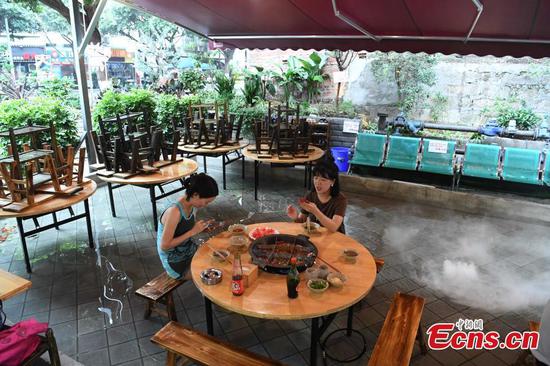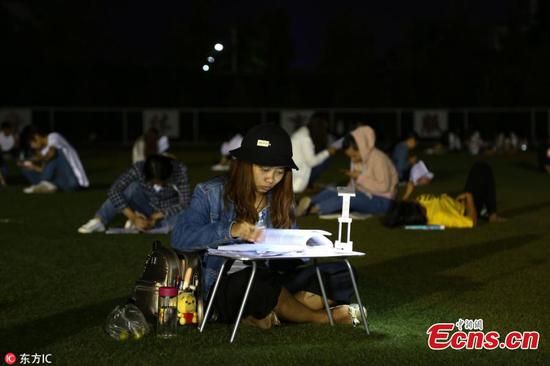
Students gather for summer school in the UK. (Photo/China Daily)
Ctrip, which released these figures in April in its 2017-18 Study Tour Market Report, said China has 180 million students from kindergarten to high school, and about 5 percent of them are expected to take part in summer schools, both domestically and internationally.
Ctrip forecasts that in three years' time 10 percent of these students will join summer camps.
Some summer camps are organized by Chinese secondary schools and universities for their students.
Others are hosted by third-party education organizations, such as New Oriental Education & Technology Group, EF Education and Pearson Global Study Tour.
Meanwhile, many niche players are also emerging in the market, offering tailor-made programs with the focus on music, drama and sports, among other trips.
Debrett's, the authority on modern British etiquette, runs a summer camp program focusing on teaching young children. The camp regularly attracts Chinese students.
UK-based CC Education runs an all-girls luxury camp in the English county of Hampshire, offering activities such as horse riding, cooking, painting, flower arrangement, dancing, music, arts and crafts.
CC Education is also launching a new program next year called Mum and Me to target Chinese and other Asian students who have limited experience of being away from home. The program allows mothers to enjoy their own activities, such as shopping, and to join their daughters after they finish class.
On average, an overseas summer camp trip costs about 29,000 yuan, significantly higher than the average cost of 4,200 yuan for a domestic study trip, according to Ctrip.
Wang Qingsu, a parent, says he feels overseas study trips are more attractive for parents who can afford to pay for them. His 11-year-old daughter Angela attended a UK summer camp last year.
"The trip allowed my daughter to improve her English, broaden her vision of the outside world, and develop an ambition to apply for university overseas later," Wang said.
Booming business opportunities, however, also create challenges. One big issue is the emergence of many different summer camps on the market, and many parents and students can be confused about which camp to pick.
Some camps are hosted by tour operators, meaning they are dominated by tourism experiences with few academic components.
"In China, this market is difficult to regulate. The existence of tourism-based study trips is not a problem because some students may prefer such trips. But these trips should not be marketed under the guise of learning-based camps," said Qian, head of the Wuhan Foreign Languages School.
Students signing up for British summer camps will find the market easier to navigate, as the British Council, a government agency, keeps a list of accredited summer schools, which it monitors regularly for quality.
Summer camps without official accreditation can still operate, but they have a harder task in persuading customers of their quality.
Most students return home with sweet memories and everlasting friendships, but some disappointments are unavoidable.
Zhang Shuji, a Shanghai University student who attended a summer camp hosted by King's College London, said she was disappointed when she realized her classes were not taught by the college's faculty members.
"I was slightly disappointed, because originally I wanted to interact with KCL professors so I could gain a better understanding of whether I wanted to apply to this university for my master's degree," said Zhang.
"It was later that I realized our classes are taught by academics freelanced by the school to teach the summer program. In the end I didn't mind too much, because the teachers were very professional, too," she said.
In most cases, summer school programs in the UK are not taught by the host institute's teachers, because these teachers take breaks in the summer during school holidays.
Another common complaint is the lack of flavor and diversity of British food.
"We ate potatoes almost every day in the school canteen, and I could hardly taste any flavor in the potatoes. In the last week of the camp, we really couldn't endure the boring food anymore, so we ended up going out to a Chinese restaurant everyday," Wu said .


















































